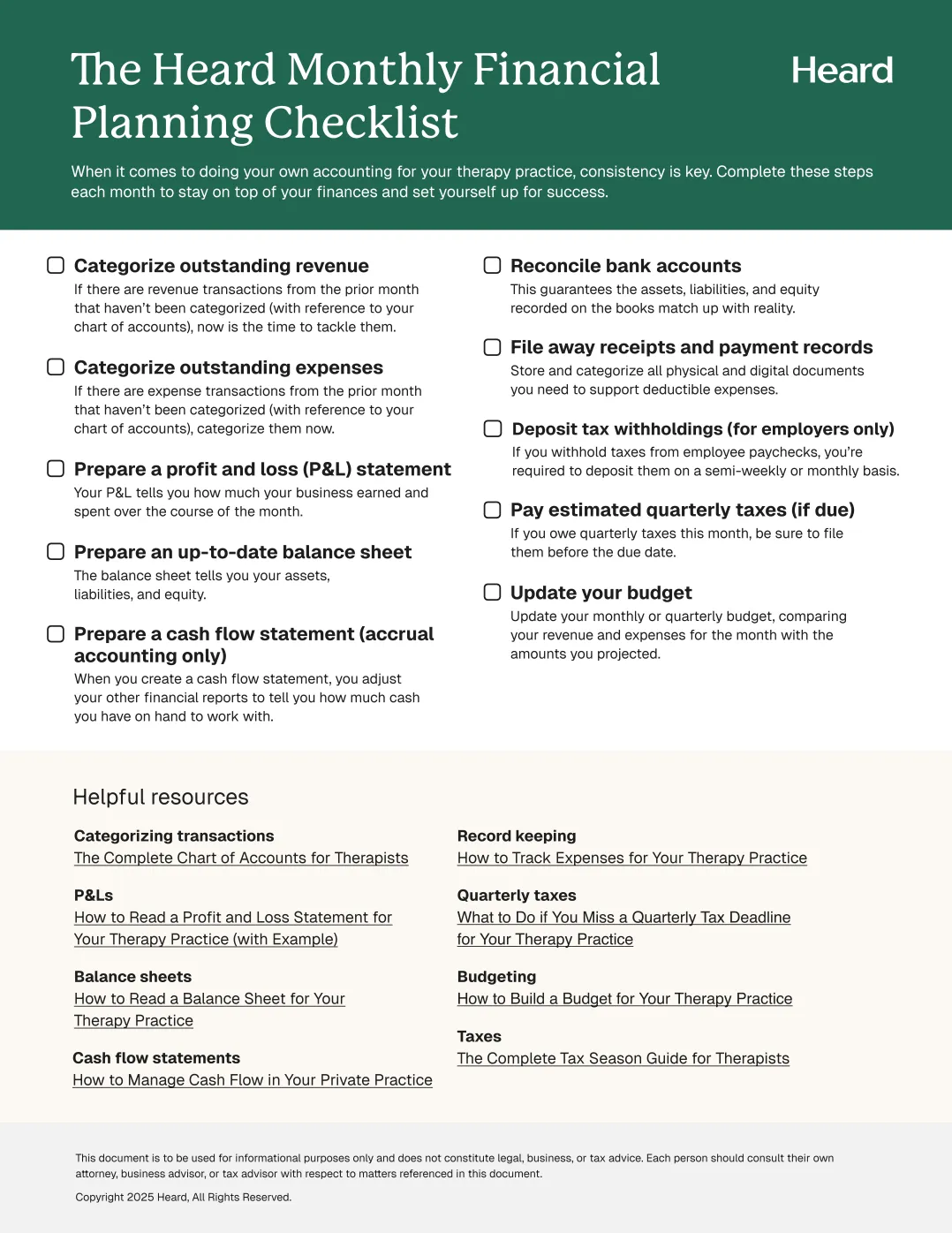You are not greedy for wanting your therapy clients to pay you fully and on time.
Sustainable income and cash flow are both key to keeping your therapy practice running. If you don’t have the cash you need to keep the lights on, you can’t keep your practice going. Paying clients—who genuinely need your help—will suffer.
Here are your options when it comes to clients who won’t pay, plus some steps you can take to avoid truancy in the future.
{{resource}}
Short-term failures to pay
When a client fails to pay the invoice you send them, it isn’t necessarily because they’ve decided they won’t pay, or that they think they can “get away with” late payments.
Financial difficulties, procrastination, disorganization, and plain old-fashioned forgetfulness can all lead to your client’s failure to pay.
The best way to approach this problem? Create a plan now, so when late payments happen, you can navigate the situation with patience and a cool head.
Inform your clients about the plan in advance
When you start working with a client, make sure they understand what happens if they fail to pay.
They should be able to anticipate, if they miss a payment, that they’ll receive reminders on a certain schedule, and that beyond a certain point in time, the issue will go from being a simple missed payment to becoming a more serious matter that could affect your ability to provide treatment.
This could be a good time to talk about why getting paid on time is important for running a sustainable practice and making sure all clients receive the treatment they deserve.
Creating a late payment plan and script
The purpose of a late payment plan is twofold:
- To give you a standard routine you can walk through in case of late payment, in the form of reminders; and
- To prepare a script you can use in advance, so reminding your clients to pay takes as little effort as possible.
You’ll need to decide:
- When you’re going to remind clients of late payments
- How long they have to pay before you consider it a serious matter
- What recourse you’ll take if they fail to pay
In terms of when you remind clients to pay, you could choose to send them reminder emails one week, two weeks, three weeks, etc. after the payment deadline for an invoice has passed. The schedule you use depends on expectations you set with clients.
How long they have before the situation becomes serious also depends upon expectations you set early on, as well as how much time and effort you believe is reasonable to invest in pursuing truant payments.
If, after X weeks or days and multiple reminders, your client still hasn’t paid, what consequences will your client face? The simplest is to refuse to book further sessions until the client has paid their balance. (Other options for dealing with large sums owed or clients who go AWOL are covered below.)
Whatever approach you take, remember to be flexible. Ideally, if a client can’t pay because they’re facing financial stressors, or if they’re unhappy with the course of their treatment, they ought to feel comfortable discussing it with you.
A sample script for late payment reminders
To help you create your own script for dealing with late payments, here are four sample emails sent out by an imaginary therapy practice to imaginary clients.
Email #1: One week after invoice deadline has passed
Subject: Late payment: First reminder
Hi Catherine,
I just want to remind you that you have a balance of $120 in unpaid fees outstanding on invoice #SL1234, which was due August 23, 2024.
I would appreciate it if you could pay this invoice as soon as possible. Otherwise, per the policy set out when I first started seeing you as a client, I may not be able to book future sessions with you.
If financial issues or other pressures are making it difficult to pay, please let me know ASAP, and we can work together to find a solution.
Thank you,
Sandra Lee
Oceanview Counseling
Email #2: Two weeks after invoice deadline has passed
Subject: Late payment: 2nd reminder
Hi Catherine,
A second reminder: you have a balance of $120 in unpaid fees outstanding on invoice #SL1234, which was due August 23, 2024.
Please pay this invoice as soon as possible. Otherwise, I may not be able to book future sessions with you.
If financial issues or other pressures are making it difficult to pay, please let me know ASAP, and we can work together to find a solution.
Thank you,
Sandra Lee
Oceanview Counseling
Email #3: Three weeks after invoice deadline has passed
Subject: Late payment: 3rd reminder
Hi Catherine,
I’m sending you a third and final reminder to let you know you have a balance of $120 in unpaid fees outstanding on invoice #SL1234, which was due August 23, 2024.
If I don’t receive payment before September 23, 2024 (one week from today), I will be forced to put a freeze on all future therapy sessions.
If financial issues or other pressures are making it difficult to pay, please let me know ASAP, and we can work together to find a solution.
Thank you,
Sandra Lee
Oceanview Counseling
Email #4: Four week after invoice deadline has passed
Subject: Putting a pause on future sessions
Hi Catherine,
I’ve sent you three reminders letting you know you have a balance of $120 in unpaid fees outstanding on invoice #SL1234, which was due August 23, 2024.
Unfortunately, I have to put a pause on all future sessions until I receive the outstanding payment.
I hope I can still support you in your mental health journey, but I can’t continue providing services until I receive payment. Please get in touch as soon as possible so we can discuss solutions.
Thank you,
Sandra Lee
Oceanview Counseling
{{resource}}
Major, long-term failures to pay (client AWOL)
In some cases, an issue with a client failing to pay may go beyond “friendly reminder” territory and become a serious issue affecting your income.
For instance, a client may owe you thousands of dollars in unpaid sessions, and then refuse to return your calls.
This situation isn’t as uncommon as it may seem. When therapists fail to set expectations and reinforce boundaries in terms of payment, clients—intentionally or otherwise—may take advantage of the situation.
And even if, on the surface, a client may seem to enjoy the benefit of “free” therapy, it could have damaging effects on their mental well-being—in the form of guilt over unpaid debts, financial stress, and a broken relationship with their therapist.
Setting clear expectations and then following up with alacrity if clients fail to pay is the simplest way to avoid serious issues.
But if you do end up in a situation where a client owes you a significant amount and goes AWOL, these your options:
1. Send a formal Demand Letter
A formal Demand Letter lays out how much your client owes you, how long they have to pay, and the consequences—legal action—if they don’t follow through. Here’s a sample Demand Letter.
If you choose this route, send your Demand Letter by registered mail and keep a copy for your files.
2. Hire a collection agency
If your client ignores a Demand Letter and the sum is significant, you can recover some of the funds by hiring a collection agency.
A collection agency will try to recover as much of the debt for you as possible, and keep a percentage of it as payment. Expect the agency’s fee to be steep—30% is a good ballpark figure—and keep in mind that they may not be able to recover all the money owed.
So, if your client owes you $2,000, and the agency can only collect $1,000, plus they charge a 30% fee, you’ll end up with $700 in your pocket.
Another option is to sell the debt to a collection agency. They’ll buy it at a fraction of the amount owed—paying, for instance, $1,000 for a $3,000 debt—and then take over responsibility for collecting.
Be warned: hiring a collection agency could really sour any goodwill left between you and your client, and even hurt your professional reputation. (More on that below.)
3. Go to small claims court
To take a client to small claims court, be prepared to formally file a complaint with the court and then keep meticulous records of the proceedings. Small claims court is expensive both in time (since you are representing yourself) and cash (missed work hours, or the need to consult with lawyers).
Don’t go down this route unless the amount owed you is truly substantial—for instance, in excess of $2,000.
When to let it go (and why)
Whether your client owes you a few hundred dollars or a few thousand, at the end of the day, you may simply be better off letting it go.
This isn’t about turning the other cheek or maintaining buddha-like mental composure (although those both may be positive side effects.)
It’s about protecting your reputation.
Therapist Tamara Suttle explains why she doesn’t pursue unpaid bills. The policy comes on good advice from her legal counsel.
Even if you’re justified in collecting a debt, doing so—particularly if you get collection agencies or small claims courts involved—may motivate your client to lash out. And that could make pursuing the unpaid debt more expensive than simply writing it off.
As Tamara explains, even if your client is technically in the wrong, that doesn’t prevent them from:
- Filing a complaint with your professional association. licensing board, or certification boards
- Filing a lawsuit against you
- Taking (totally legal) steps to hurt your reputation, ranging from negative Google Reviews and social media screeds to bad word-of-mouth campaigns in your community
In the end, it’s up to you which approach you take. But before you do, consider all the possible consequences, and ask yourself: Is it worth the trouble?
Writing off bad debt
If you use the accrual accounting system to do your books, you’ll need to write off unpaid invoices on the books (ie. removing the assets from Accounts Receivable.)
If you’ve made a mistake and recorded as income debts you were never able to collect, you may need to write them off on your next tax return so you aren’t charged income tax for them.
Check out our article on therapists and bad debt for a deeper dive.
How to avoid late payments from therapy clients
In an ideal scenario, your clients would never be late paying you and you would never need to remind them to pony up the cash.
That scenario may remain only an ideal, but you can get as close as possible to it by implementing policies like:
- Payment in advance. Accept payment from your client at the beginning of every session.
- Payment in person. Whether you get paid before or after each session, do it immediately while you and your client are in the office together (but outside of time scheduled for treatment).
- Cards on file. When you begin working with a client, put their credit card on file, with a signed understanding between the two of you that you will automatically charge it at the conclusion of each session.
- Post-dated checks. It’s an old school approach, but if your client doesn’t have a credit card or would rather not put one on file, collect checks for one month or one quarter’s therapy sessions in advance and cash them for each session.
—
Timely and accurate client payments start with timely and accurate therapists invoices. Learn how to create an invoice for your therapy practice.
This post is to be used for informational purposes only and does not constitute legal, business, or tax advice. Each person should consult their own attorney, business advisor, or tax advisor with respect to matters referenced in this post.
Bryce Warnes is a West Coast writer specializing in small business finances.
{{cta}}
Manage your bookkeeping, taxes, and payroll—all in one place.

Discover more. Get our newsletter.
Get free articles, guides, and tools developed by our experts to help you understand and manage your private practice finances.





